

Jupiter facts. What is the Temperature of Jupiter? Jupiter Facts - Facts about Planets - Interesting Facts About Jupiter. Distinst. JUPITER - ENCHANTED LEARNING SOFTWARE. Jupiter is the fifth and largest planet in our solar system.
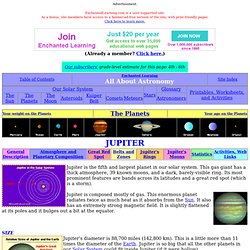
This gas giant has a thick atmosphere, 39 known moons, and a dark, barely-visible ring. Its most prominent features are bands across its latitudes and a great red spot (which is a storm). Jupiter is composed mostly of gas. This enormous planet radiates twice as much heat as it absorbs from the Sun. It also has an extremely strong magnetic field. Jupiter's atmosphere. Most Interesting Facts about Jupiter. There is a lot more to know about the planet Jupiter other than the well-known fact that it is the largest planet in the solar system!

Jupiter is nothing like our planet Earth, but it definitely is a planet that you would want to visit at least once ... would that be possible? When I was young, remembering the names of all the planets in the right order was something that took a long time for me to register! However, there are two planets that were my favorite among all, these were - our very own planet Earth, and Jupiter. Earth, because it was the planet that I lived on, and I know that it is beautiful. Interesting Facts About Jupiter. As of July 1, 2013 ThinkQuest has been discontinued.

We would like to thank everyone for being a part of the ThinkQuest global community: Students - For your limitless creativity and innovation, which inspires us all. Teachers - For your passion in guiding students on their quest. Partners - For your unwavering support and evangelism. Parents - For supporting the use of technology not only as an instrument of learning, but as a means of creating knowledge. We encourage everyone to continue to “Think, Create and Collaborate,” unleashing the power of technology to teach, share, and inspire. Jupiter. Gasses. Jupiter - Interior - Atmosphere - Moons - Poles - Myths - Missions.
Jupiter. Most Interesting Facts about Jupiter. Jupiters gravity. Jupiters rotaion. Planet Jupiter Facts for Kids. Are you searching for kid's facts about the planet Jupiter?
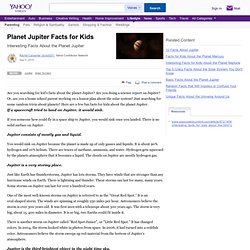
Are you doing a science report on Jupiter? Or, are you a home school parent working on a lesson plan about the solar system? Just searching for some random trivia about planets? Here are a few fun facts for kids about the planet Jupiter. If a spacecraft tried to land on Jupiter, it would sink. If you someone how could fly in a space ship to Jupiter, you would sink once you landed. Jupiter consists of mostly gas and liquid. Jupiter. Great Red Spot (storm system, Jupiter) Jupiter l Jupiter facts, pictures and information. Jupiter is the fifth planet from the Sun and by far the largest.
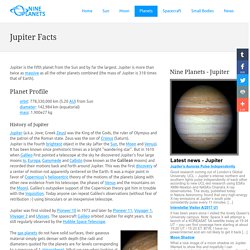
Jupiter is more than twice as massive as all the other planets combined (the mass of Jupiter is 318 times that of Earth). Planet Profile orbit: 778,330,000 km (5.20 AU) from Sundiameter: 142,984 km (equatorial)mass: 1.900e27 kg History of Jupiter Jupiter (a.k.a. Intresting facts. Rotation 9 hours and 55 minutes. Temperature of Jupiter. Want to stay on top of all the space news?
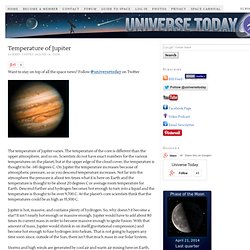
Follow @universetoday on Twitter. Red spot. Jupiter – Facts and Information about the Planet Jupiter. Jupiter is the largest planet in the solar system.
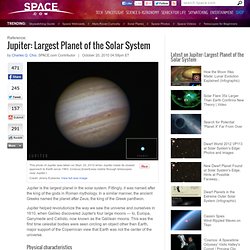
Fittingly, it was named after the king of the gods in Roman mythology. In a similar manner, the ancient Greeks named the planet after Zeus, the king of the Greek pantheon. Jupiter helped revolutionize the way we saw the universe and ourselves in 1610, when Galileo discovered Jupiter's four large moons — Io, Europa, Ganymede and Callisto, now known as the Galilean moons. This was the first time celestial bodies were seen circling an object other then Earth, major support of the Copernican view that Earth was not the center of the universe.
Physical characteristics Jupiter is the most massive planet in our solar system, more than twice as massive as all the other planets combined, and had it been about 80 times more massive, it would have actually become a star instead of a planet. The most extraordinary feature on Jupiter is undoubtedly the Great Red Spot, a giant hurricane-like storm seen for more than 300 years. Composition & structure. Atmosphere of Jupiter. Cloud pattern on Jupiter in 2000.
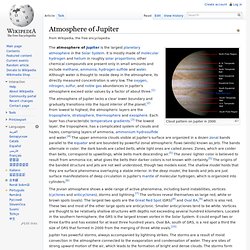
The atmosphere of Jupiter is the largest planetary atmosphere in the Solar System. It is mostly made of molecular hydrogen and helium in roughly solar proportions; other chemical compounds are present only in small amounts and include methane, ammonia, hydrogen sulfide and water. Although water is thought to reside deep in the atmosphere, its directly measured concentration is very low. The oxygen, nitrogen, sulfur, and noble gas abundances in Jupiter's atmosphere exceed solar values by a factor of about three. The Jovian atmosphere shows a wide range of active phenomena, including band instabilities, vortices (cyclones and anticyclones), storms and lightning.[7] The vortices reveal themselves as large red, white or brown spots (ovals). Jupiters moons. Ten Facts about Jupiter - Bob the Alien's Tour of the Solar System.
Fact One Jupiter has a liquid metal ocean (metallic hydrogen) at its centre, surrounded by thousands of kilometres of hydrogen and helium gas.
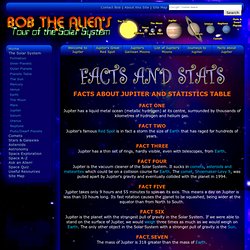
Fact Two Jupiter's famous Red Spot is in fact a storm the size of Earth that has raged for hundreds of years. Fact Three. Fun Jupiter Facts for Kids - Amazing Information About This Big Planet. Gas gaint. Discovering jupiters moons. Jupiter. Great Red Spot, an enormous, long-lived storm. Jupiter – Facts and Information about the Planet Jupiter. Jupiter: Read More. Jupiter is the largest and most massive planet in our solar system, containing more than twice the amount of material of the other bodies orbiting our sun combined.
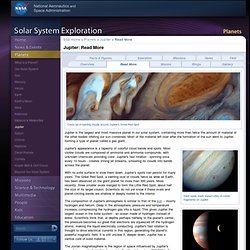
Most of the material left over after the formation of the sun went to Jupiter, forming a type of planet called a gas giant. Jupiter's appearance is a tapestry of colorful cloud bands and spots. Most visible clouds are composed of ammonia and ammonia compounds, with unknown chemicals providing color. Jupiter's fast rotation - spinning once every 10 hours - creates strong jet streams, smearing its clouds into bands across the planet. With no solid surface to slow them down, Jupiter's spots can persist for many years. Gaseuos. Jupiter. Structure Jupiter is composed primarily of gaseous and liquid matter. It is the largest of four gas giants as well as the largest planet in the Solar System with a diameter of 142,984 km (88,846 mi) at its equator. The density of Jupiter, 1.326 g/cm3, is the second highest of the gas giants, but lower than for any of the four terrestrial planets. Composition Jupiter's upper atmosphere is composed of about 88–92% hydrogen and 8–12% helium by percent volume or fraction of gas molecules.
Based on spectroscopy, Saturn is thought to be similar in composition to Jupiter, but the other gas giants Uranus and Neptune have relatively much less hydrogen and helium.[21] Because of the lack of atmospheric entry probes, high-quality abundance numbers of the heavier elements are lacking for the outer planets beyond Jupiter. Mass Jupiter's diameter is one order of magnitude smaller (×0.10045) than the Sun, and one order of magnitude larger (×10.9733) than the Earth. Internal structure Atmosphere. Jupiter - Planets for Kids! Jupiter - biggest planet. Facts for Kids- Jupiter.
Fun Jupiter Facts for Kids - Amazing Information About This Big Planet. Jupiter Facts. Jupiter Facts - PlanetFacts.net. Jupiter is the largest planet in our Solar System. Ancient Astronomers named Jupiter after the king of the Roman Gods. Jupiter is the 5th closest planet to our sun. The atmosphere of Jupiter consists of about 84 percent Hydrogen and about 15 percent helium, with small amounts of acetylene, ammonia, ethane, methane, phosphine, and water vapor. Jupiter Facts You Might Not Know About If you weigh 100 pounds on Earth, you would weigh 264 pounds on Jupiter.
Jupiter has a mass 318 times greater than the Earth's and a diameter that is 11 times larger.